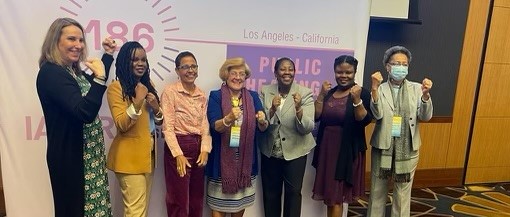
Standing with Haitian Women this International Day for the Elimination of Violence Against Women
Tomorrow’s International Day for the Elimination of Violence Against Women (IDEVAW) could be seen as a marker of the profound ways in which successive corrupt and repressive governments and the international actors who have enabled them have failed Haiti’s women and girls. Haiti is currently experiencing a deep governance and insecurity crisis characterized by widespread and grotesque use of sexual violence against women and girls by gangs, including as a tool of control and punishment. Collective rape is “endemic,” protections are lacking, and resources are limited. These assaults are taking place against a background of persistently high rates of violence and discrimination faced by Haitian women in the home and in public spaces, all with near-total impunity. Among the long-term causes are structural, economic, and social challenges that are the legacy of colonialism and extractive foreign interventions. Add to that deeply rooted patriarchal values characterized by a permissive attitude toward discrimination and gender-based violence (GBV). More proximate causes include corrupt governments – supported and propped up by international actors – which have empowered the gangs wreaking havoc in Haiti today and deliberately weakened Haiti’s institutions and public services.
But Haitian women and girls are fighting back, which is why the 2023 IDEVAW and the 16 Days of Activism Against Gender-Based Violence it kicks off, are an even better opportunity to celebrate – and actively support! – their advocacy and mobilization.
That work is varied. Much of it focuses on critical immediate needs by providing services and resources: the Haitian government has long failed in its responsibilities, and most support for GBV victims is provided by local organizations or international partners. Even as catastrophic insecurity has impeded their work and put their lives at risk, these activists run shelters, offer medical care and psychological support, and provide legal assistance. The latter is a critical element of systematically confronting and preventing GBV, including by forcing Haiti’s justice system to take seriously violence against women and other gender-based harms. The Rape Accountability and Prevention Project (RAPP) run by Haiti-based Bureau des Avocats Internationaux (BAI) is one example, and combines legal advocacy on behalf of victims with community organizing to educate about women’s rights, mobilize action, and build a movement for sustained change.
That kind of mobilizing, policy, systems-changing work centering Haitian women as leaders and decision-makers is often under-resourced and deprioritized in the face of immediate needs to care for survivors, especially in a crisis like this one. But it is work that is critical if we are serious about preventing such harms and the next crisis; and it is imperative for fully vindicating the rights of Haitian women and girls to be free from violence and discrimination. In turn, evidence from around the world makes clear that when women achieve equality and security, the entire community enjoys higher prosperity and peace.
Haitians are doing that work and building an underlying movement. A coalition of Haitian and solidarity organizations obtained a hearing before the Inter-American Commission on Human Rights (IACHR) on International Women’s Day this year, where they exposed the acute nature of the crisis facing Haiti’s women and girls along with its long-term antecedents, and demanded a human rights response (which the IACHR and Haiti’s illegitimate, corrupt, and repressive de facto government have yet to deliver). Activists held a large International Day of Abortion demonstration to demand reproductive rights in spite of acute danger for women in public. Twelve years ago, the BAI could not find a single woman to staff RAPP. It has since invested in supporting women law graduates in completing their training, breaking down systemic gendered barriers in the legal profession while building the movement of talented and passionate advocates. Today, RAPP is co-led by one of the women graduates BAI trained, and four more just completed the difficult hurdle of writing a thesis – made yet more challenging by Haiti’s acute crisis. So the movement grows.
“We in BAI – the women that are defending the rights of women and girls that are victims of rape or conjugal violence – are faced everyday with cynicism and sexism from men in the system,” shared RAPP co-lead Me Abigaïl Derolian during a webinar celebrating the graduates.“[T]he fight that is being done along with BAI for women and young girls that are victims of violence – it shows how important it is for us not to stop . . . in spite of all the barriers. . . . It is a pillar for us to continue to fight.”
In a recent discussion about GBV and the crisis in Haiti, feminist activist and co-director of Haitian feminist organization Negès Mawon Pascale Solages emphasized: “[Haitian] women & girls aren’t just victims & survivors. They are building peace, too. They are doing the work – work of the state, the work of the international community. We have to survive and build the country that we want as citizens, as women.“
This is work worth supporting, and this year’s IDEVAW and 16 Days of Activism are a great opportunity to reinforce, uplift, and build on the leadership of Haitian women in their fight to address and prevent GBV and expand gender equality. An effective response to widespread violence against women and Haiti’s broader crisis must include deliberate action to support women’s leadership, enable women’s participation in decision-making, and center the specific needs of women and girls across every undertaking, all alongside active measures to include women and girls with marginalizing identities.
Posted November 24, 2023